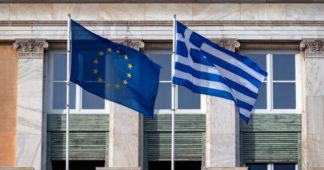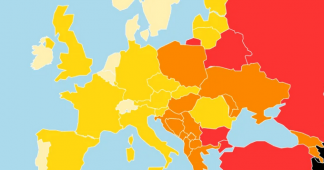Analysis: While steep decline in press freedom may have petered out, myriad of challenges remain
By IPI Europe Advocacy Officer
Jamie Wiseman
Jan 10, 2024
All is not well for press freedom in the birthplace of democracy. Over the last few years, media freedom in Greece has undergone a clear erosion, seeing the Mediterranean country tumble down press freedom rankings to the lowest in the European Union, setting alarm bells ringing in Brussels and beyond. During this time, the country has experienced the broad-daylight assassination of a crime reporter, multiple arson attacks on media offices, a sprawling spyware scandal, and a string of vexatious lawsuits against the investigative journalists, to name but a few.
These high-profile attacks on the freedom of the press have put the spotlight on Greece, leading to increased scrutiny from the European Commission and a recent international fact-finding mission by a coalition of international media freedom organisations, including the International Press Institute (IPI). However, the immediate challenges sit atop far deeper systemic issues, including a lack of media pluralism, threats to media independence stemming from oligarchic ownership, and weak press regulation. Complicating the picture further is a media market battered by repeated economic and financial crises, which hollowed out the advertising market and drove legacy media into the hands of shipowner moguls. The result is a media landscape characterized by high levels of fragmentation and polarization and widespread self-censorship amongst an under-protected and under-funded journalistic profession.
While the environment for a free press and independent journalism has long faced challenges, the decline in recent years dovetailed with the election in 2019 of the centre-right New Democracy party led by Prime Minister Kyriakos Mitsotakis. The party was handed a second mandate by voters in a snap parliamentary election in June 2023. While New Democracy has overseen a successful stabilization of the economy, concern has mounted over its record on democratic values such as media freedom and human rights, as well as a major wiretapping scandal involving politicians, officials and journalists which has drawn comparisons to Watergate. Faced with growing unease over its press freedom credentials, the government has taken some steps to try and remedy the situation, including the establishment of a working group for the safety of journalists. While some positive changes have emerged, the reaction of Greek authorities has not matched the scale and severity of the challenges facing the country’s media.
An assassination in Athens
The hammer blow for press freedom in Greece came on the afternoon of 9 April 2021 in a suburb outside the capital Athens. As veteran crime reporter Giorgos Karaivaz was returning home from work, he was gunned down in broad daylight by two men on a moped. The assassins shot him ten times with a silenced weapon. The journalist had worked for the TV channel STAR and ran his own blog reporting on the nexus between the Greek criminal underworld and allegedly corrupt police officials. Authorities immediately pointed the finger at organized crime groups and described the murder as a “professional hit”. Amidst the outcry, the government promised swift response. However, more than two years passed without significant updates. That finally changed earlier this year when two brothers, both Greek nationals, were arrested on suspicion of carrying out the murder. The trial has not yet begun and no further arrests have been made since then. To date, no alleged middlemen or masterminds have been publicly identified or apprehended and no convictions have been secured. This ongoing impunity for the murder continues to cast a chilling effect over the Greek journalistic profession.
While the killing of Karaivaz was the most visceral example, the wider situation for the safety of journalists in Greece in the last few years has been among the worst in the EU. In 2022, the headquarters of Real Media Group in Athens was the target of an arson attack, which caused serious fire damage but no injuries. The same year, other journalists faced unsuccessful gas cannister attacks outside their houses. Also in 2021, the editor-in-chief of a leading daily newspaper was given police protection after receiving information from a source about a death contract circulating within the criminal underworld. Several journalists have been physically attacked and injured by riot police while covering demonstrations. More recently, in August 2023 a journalist at newspaper TA NEA was punched in the back of the head by a well-known businessman and shipowner. In virtually none of these cases has the perpetrator been sentenced or jailed. Likewise, the killing in 2011 of another journalist, Sokratis Giolias, remains unsolved. As a result, trust in the ability of law enforcement authorities and prosecutors to bring justice is low, worsening the climate of impunity.
The Greek Watergate
As well as fears about the safety of journalists on the street, security in the digital realm remains a threat. Starting in 2021, multiple revelations came to light about the surveillance of Greek journalists through both legal wiretapping and illegal spyware. Several journalists and media owners were wiretapped by the National Intelligence Service (EYP), a body which was brought under the control of the Prime Minister’s office immediately after the Mitsotakis government was formed. Even though authorities justified these bugs as being in the interest of protecting national security, journalists were surveilled while they were working on stories such as banking corruption. Another journalist, Stavros Malichudis from investigative media outlet Solomon, was surveilled while working on a human-interest story about a child refugee, sparking serious concern about the abuse of intelligence services.
In addition to this controversial but technically legal wiretapping, at least one journalist in Greece was targeted with spyware. In April 2022 it was revealed that financial and banking reporter Thanasis Koukakis, who works for CNN Greece and other international media, was surveilled for at least ten weeks in summer 2021 using a powerful spyware tool called Predator. It was the first reported case of a journalist anywhere in the world being hacked using the technology, which is marketed by shady firm Intellexa. Like the better-known Pegasus spyware, it is also capable of infecting a victim’s mobile phone, accessing its data and secretly turning it into a listening device in the user’s pocket. The Greek government immediately denied any role, nodding instead to a vague non-state actor. As investigative journalists published additional revelations, the narrative shifted and the Prime Minister eventually blamed rogue actors within the intelligence services. As demands for accountability mounted, Mitsotakis’ general secretary, who also happened to be his nephew, was fired, along with the head of the intelligence agency. Though authorities continue to deny a role in the spyware use and have since passed a law to ban outright any use of spyware, a clear pattern exists between the end of legal wiretapping of journalists, and the beginning of illegal spyware, indicating a clear coordination in the use of spying tools and pointing the finger at the state. Although numerous legal complaints were filed, no accountability for the violation of individual privacy or the confidentiality of journalistic sources has been achieved. Criminal probes have so far achieved nothing.
Legal jeapordy
In recent years Greece has also experienced an increase in the number of vexatious defamation lawsuits and Strategic Lawsuits Against Public Participation (SLAPPs) – mirroring a growing trend across Europe. Standout cases include a SLAPP lawsuit filed by the Prime Minister’s nephew against the media outlets that revealed his links with spyware firms, which led to his resignation. In the north of the country, investigative media outlet Alterthess was sued under GDPR rules for a court report which stated the name of a gold mining executive convicted for the firm’s environmental pollution. Examples of this kind of abusive litigation abound. In another alarming legal case, four Greek journalists and publishers faced criminal charges and potential lengthy prison sentences linked to their media outlets’ investigative reporting which unveiled a pharmaceutical scandal. All four were finally acquitted in July 2022.
Though the Greek government has complained about its dismal ranking as the worst country for media freedom in the EU, below countries like Poland or even Hungary, the reality is that in neither of these countries has a journalist been murdered in broad daylight in recent years, nor do journalists there faced such a toxic range of pressures, from surveillance to SLAPPs to physical attacks. In the EU, only Hungary has experienced more cases of journalists being monitored using spyware during this time. And while Greece does not exhibit the same form of state-driven media capture pioneered by Victor Orbán – in which a pro-government media ecosystem bloated by state advertising dominates public discourse – Greece’s media ecosystem suffers from multiple long-term and systemic challenges.
A crisis for independent media
Many of these can be traced to the country’s prolonged financial crisis, which severely weakened the media market and deepened the toxic entanglement of media with vested political and business interests. Ownership of major print and television channels by familial dynasties and shipping magnates, many of whom have political connections and cross-ownership interests in industries dependent on state contracts, exposes these media to potential conflicts of interest and weakens their editorial independence. As a result, although direct acts of censorship are rare, self-censorship is rife within the journalistic profession and certain topics are widely understood to be off-limits. News reporting that risks damaging the message control of the government, including reporting on topics such as refugee pushbacks or human rights violations, are largely absent in the mainstream media, particularly television. The economic precariousness of journalists in Greece caused by low wages and weak industry protections leaves media professionals more vulnerable to editorial pressures.
To complicate matters further, the country’s public broadcaster, the Hellenic Broadcasting Corporation (ERT) and the Athens-Macedonian News Agency, the main press agency, remain under the direct oversight of the office of the Prime Minister. This decision to enforce closer political control over the public media bodies was one of the first acts when Mitsotakis took power. While the bodies have stabilized after a period of crisis, this continues to pose major questions over their independence, despite ostensible safeguards. The independence and competence of the National Council for Radio and Television (NCRTV) regulator also remains in doubt.
Amongst the many issues, there are positive examples. Yet while the country benefits from a small but highly professional group of independent and investigative media publishing award-winning public interest journalism, these titles remain isolated on the fringes of the media landscape and lack support. Bombshell revelations made by these investigative media are routinely ignored or spun in a way to reduce potential damage for the government. The combination of these many challenges means Greek journalism faces a crisis of credibility and is one of the EU countries with the lowest level of trust in media by citizens, according to the Reuters Institute for the Study of Journalism.
Policies to turn the tide
To stem the tide and address growing alarm from Brussels, the government in 2022 established a task force for journalists’ safety, which brings together police, prosecutors, journalists unions and associations, among others. A controversial amendment which passed a law regulating “fake news” was scrapped. To head off the surveillance scandal, the government passed a law officially banning all use of spyware, though trade of the technology from within Greece remains legal. At the systemic level too, steps have been taken. Positive changes include the new Registry for Print Media (MET) and Registry for Electronic Press (MHT), which aim to improve the transparency of media ownership, including beneficial ownership. Under a new system, media not registered in these bodies are not eligible to benefit from state advertising campaigns. This comes after a pandemic-era scandal in 2020, dubbed the “Petsas list”, in which money for public health messaging in media was distributed in a discriminatory manner. While these changes appear good on paper, their impact has yet to be seen.
Ultimately, the challenges of pluralism and media independence are among the most complex to address and any positive developments in Greece will require action and responsibility from journalists and media, backed by unions, supported by strong political will from the government. While the steep deterioration in press freedom that began in 2021 appears to have petered out for now, much remains to be done to address and improve the situation. There is a sense among journalists and media freedom groups that the response of the Greek authorities is out of step with the severity of the situation. Among the actions required from the state level are far stronger mechanisms to protect the safety of journalists, full justice for the murder of Karaivaz, proper accountability for illegal surveillance, and the implementation of better laws to protect media independence and pluralism. Rebuilding the severely eroded pillars of media freedom will be no easy task, yet one that is essential for the resilience of Greece’s democracy.
This text was originally published in the British Journalism Review on 4 December 2023
We remind our readers that publication of articles on our site does not mean that we agree with what is written. Our policy is to publish anything which we consider of interest, so as to assist our readers in forming their opinions. Sometimes we even publish articles with which we totally disagree, since we believe it is important for our readers to be informed on as wide a spectrum of views as possible.











